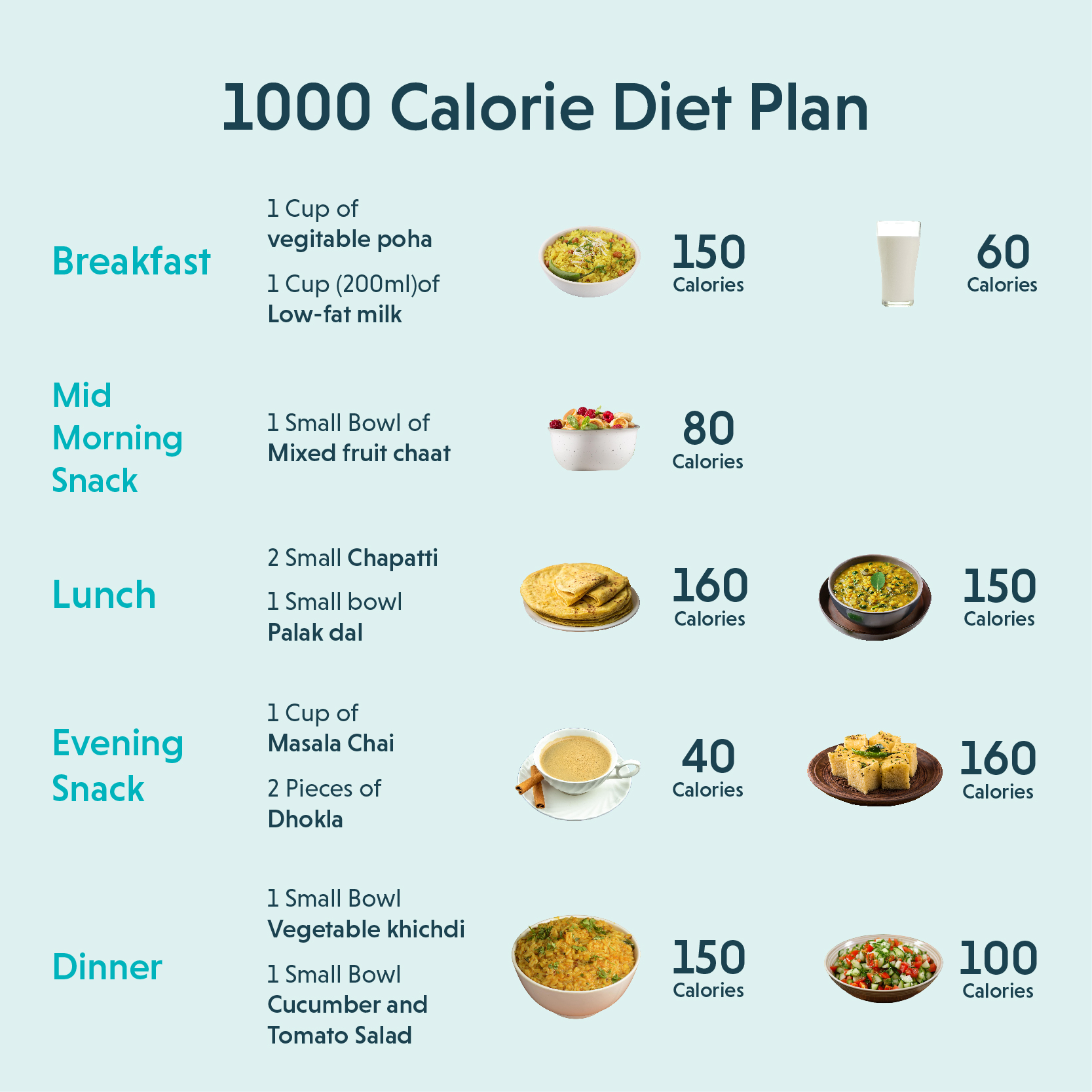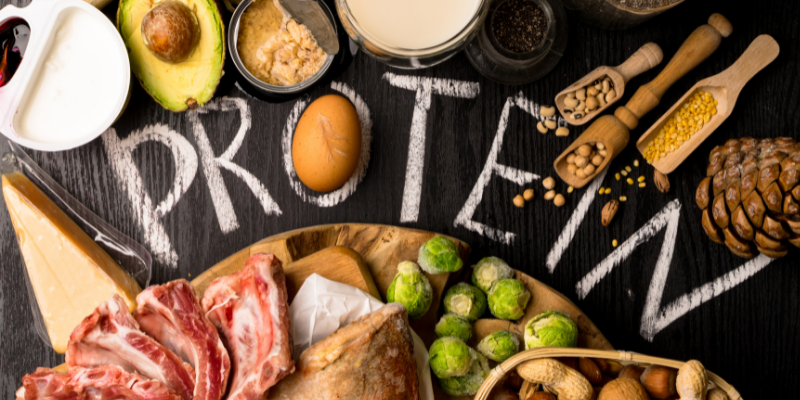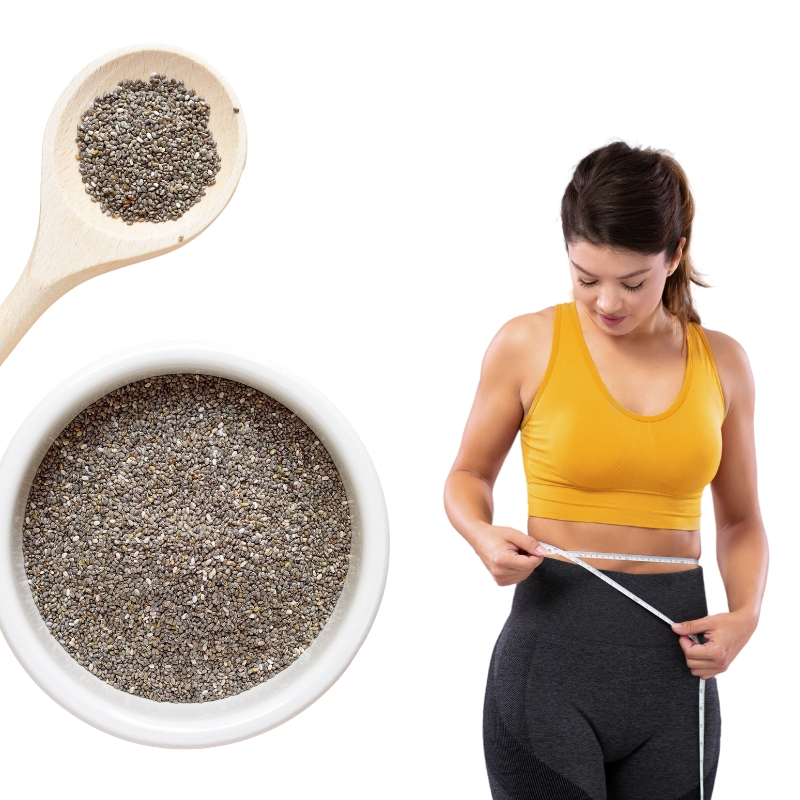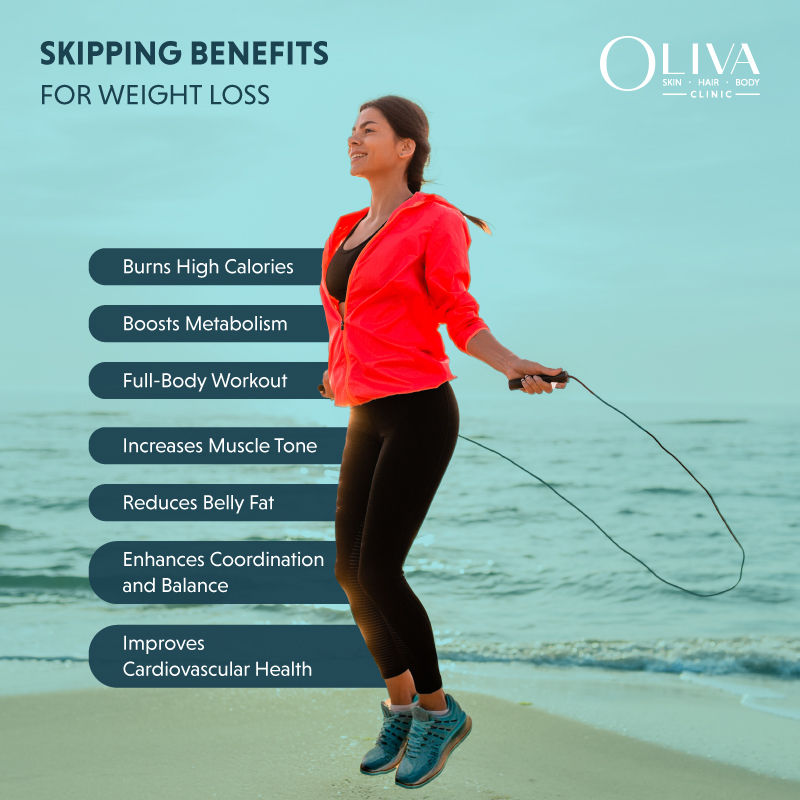1000 Calorie Diet Plan: Sample Diet Chart For Weight Loss
Table of Contents

Are you planning to lose weight by cutting down your calorie intake? Have you heard about the 1000 calorie diet? Find out is 1000 calorie diet safe here. Also, discover a few samples of the 1000 calorie diet plan along with dos and don’ts.
What Is A 1000 Calorie Diet Plan?
When it comes to weight loss, the 1000 calorie diet plan is a powerful tool that is well-known for providing quick results. This dietary approach seeks to create a significant calorie deficit by capping daily caloric intake at 1000 calories or less, which encourages the body to use fat stored as fuel.
However, what exactly is the 1000 calorie diet plan, and why has it become so popular as a successful plan for losing excess weight? Let’s examine it at length and learn about its benefits and side effects to help you make an informed decision.
1000 Calorie Diet Plans:
The 1000 calorie diet chart is a structured meal plan that restricts daily calorie intake to 1000 calories or less. Typically, this involves careful meal planning and portion control to ensure that each meal adheres to the calorie limitation strategy. While the components of a 1000 calorie diet plan for weight loss may change, the focus remains on foods that offer vital nutrients such as vitamins, minerals, and others despite constrained calorie consumption.
Sample Of 1000 Calorie Diet Plan:
Here are three samples of 1000 calorie diet charts for you:
| Meal | Menu | Quantity | Calories | |
| Diet Plan 1 |
Breakfast
|
Vegetable poha
Low-fat milk |
1 cup
1 cup (200ml) |
150 kcal
60 kcal |
| Mid-Morning Snack | Mixed fruit chaat | 1 small bowl | 80 kcal | |
| Lunch | Chapatti
Palak dal |
2 small
1 small bowl |
160 kcal
150 kcal |
|
| Evening Snack | Masala chai
Dhokla |
1 cup
2 pieces |
40 kcal 120 kcal |
|
| Dinner | Vegetable khichdi
Cucumber and tomato salad |
1 small bowl
1 small bowl |
150 kcal 100 kcal |
|
| Total Calories | 1010 kcal |
| Meal | Menu | Quantity | Calories | |
| Diet Plan 2 | Breakfast | Idli
Low-fat curd |
2 small
1 small bowl |
150 kcal 60 kcal |
| Mid-Morning Snack | Sprouts salad | 1 small bowl | 80 kcal | |
| Lunch | Chapatti
Mixed vegetable curry |
2 small
1 small bowl
|
80 kcal 150 kcal
|
|
| Evening Snack | Roasted chana | 1 small bowl | 100 kcal | |
| Dinner | Moong dal soup
Vegetable uttapam |
1 small bowl
2 pieces |
100 kcal 230 kcal |
|
| Total Calories | 950 kcal |
| Meal | Menu | Quantity | Calories | |
| Diet Plan 3 | Breakfast | Oats porridge
Fresh orange juice |
1 small bowl
1 glass (200ml) |
200 kcal
70 kcal |
| Mid-Morning Snack | Mixed fruit salad | 1 small bowl | 80 kcal | |
| Lunch | Chapatti
Chole |
1 small bowl
1 small bowl |
80 kcal
200 kcal |
|
| Evening Snack | Green tea
Vegetable cutlets |
1 cup
2 pieces |
0 kcal 120 kcal |
|
| Dinner | Vegetable soup
Quinoa pulao |
1 small bowl
1 small bowl |
60 kcal 200 kcal |
|
| Total Calories | 1010 kcal |
A Word Of Caution:
Consulting a qualified nutritionist is a must before following a 1000 calorie diet plan to avoid serious health complications.
Foods To Include In A 1000 Calorie Diet Menu For Fast Weight Loss:
Here are some must-have foods you need to include in your 1000 calorie diet plan:
- Add lean meats like chicken and fish to your daily diet plan. If you are a vegetarian, you can go for tofu. A 1000 calorie high protein diet menu can provide essential amino acids for muscle repair and growth, aiding in weight loss and maintaining muscle mass.
- Non-starchy vegetables like spinach, broccoli and bell peppers can add a lot of flavour and nutrition to your 1000 calorie daily menu. These superfoods are low in calories and high in fibres, vitamins, and minerals, promoting satiation and supporting overall health.
- Switch to whole grains like quinoa, brown rice and oats, as these are rich in fibres and complex carbohydrates and provide sustained energy and aid digestion.
- Munch on low-calorie fruits like berries, apples and oranges, as they are storehouses of vitamins, minerals, and antioxidants. Include them in your 1000 calorie diet menu to add sweetness and nutrition while aiding hydration and digestion.
- Choose low-fat dairies like Greek yoghurt and skinny milk, as part of your 1000 calorie low-fat diet plan. These are excellent sources of calcium and proteins, supporting bone health and muscle repair with fewer calories and fats compared to full-fat dairy products.
- Include legumes like lentils, chickpeas and black beans as part of your 1000 calorie high-protein diet menu. They are rich sources of proteins and fibres and promote satiety, regulate blood sugar levels, and support digestive health.
- Snack on nuts and seeds like almonds, chia seeds and flax seeds, as they are rich in healthy fats, proteins, and fibres. Nuts and seeds provide satiation and essential nutrients to support heart health and weight management.
- Opt for foods that have healthy fats like avocado, olive oils and fatty fish as these are essential for hormone production and nutrient absorption. Healthy fats provide satiation and support brain and heart function.
- Herbs and spices like ginger and cinnamon are a must-add to your 1000 calorie diet plan. Low in calories but rich in flavours, these herbs enhance the taste of meals.
- Sipping on water and herbal teas for hydration is crucial for overall health and weight management.
Foods To Avoid In A 1000 Calorie Diet Chart
Here are some foods that you should strictly avoid if you are on a 1000 calorie diet for fast weight loss:
- Processed Foods: Avoid high-calorie junk foods like chips and packaged snacks as they are high in unhealthy fats, sugars, and additives. Processed foods lead to weight gain and increase the risk of chronic diseases.
- Sugary Beverages: Stay away from soda and fruit juices that are full of added sugar and empty calories. Sugary beverages spike blood sugar levels and cause weight gain and metabolic disorders.
- Fried Foods: Avoid bingeing on oily snacks like potato fries and fried chicken. Remember, fried foods lead to inflammation, weight gain, and increased risk of heart disease.
- High-Calorie Condiments: Skip adding mayonnaise and creamy dressings as they are high in calories, saturated fats, and added sugar. Having high-calorie condiments can sabotage your weight loss efforts and increase the risk of metabolic diseases.
- White Bread And Pasta: Refined carbs like white bread and pasta cause rapid spikes in blood sugar levels, leading to cravings and overeating.
- Sweetened Snacks And Desserts: Do not munch on cookies and pastries to avoid empty calories that cause weight gain and metabolic concerns.
- Alcohol: High in calories and devoid of nutritional value, alcohol can hinder weight loss efforts and lead to overeating.
- Sugar-coated Cereals: Often high in added sugars and low in fibre, breakfast cereals contribute to blood sugar spikes and crashes, promoting weight gain and hunger.
- High-Fat Meats: Do not eat beef and processed meats, as they are high in unhealthy saturated fats and calories. They increase the risk of heart diseases and weight gain when consumed in excess.
- Artificial Sweeteners: While low in calories, artificial sweeteners may disrupt metabolism and increase cravings for sweets, potentially hindering weight loss efforts.
Benefits Of A 1000 Calorie Diet Plan:
Here are the top benefits you can look forward to enjoying when following a 1000 Calorie diet menu:
-
Aids Fast Weight Loss:
The 1000 calorie diet facilitates the quick shedding of excess pounds by creating a significant calorie deficit.
-
Improves Metabolism:
Short-term calorie restrictions can boost metabolism, aiding in more efficient calorie burn even with reduced intake.
-
Promotes Fat Loss:
By creating a calorie deficit, the diet prompts the body to utilise the stored fat for energy, promotes fat burn and reduces body fat.
-
Enhances Insulin Sensitivity:
Calorie restriction may enhance insulin sensitivity, lowering the risk of insulin resistance and type 2 diabetes.
-
Maintains Weight:
Mindful eating habits and portion control with the diet support long-term weight management and healthy lifestyle choices.
-
Enhances Overall Health:
Achieve tangible weight loss results that can boost self-image and promote physical health.
Side Effects Of The 1000 Calorie Diet Plan :
Here are some side effects you must be aware of before starting to follow a 1000 Calorie diet plan for weight loss:
-
Tiredness:
Low-calorie intake can lead to tiredness with reduced energy levels impacting daily activities.
-
Weakness:
Insufficient calorie intake may result in weakness and decreased physical strength, affecting exercise performances.
-
Dizziness:
Some individuals may experience dizziness due to low blood sugar levels induced by the diet, potentially impairing daily functioning.
-
Hair Loss:
Inadequate calorie intake may trigger hair loss as the body prioritises critical functions over non-essential ones like hair growth.
-
Nutrient Deficiencies:
A very low-calorie intake increases the risk of nutrient deficiencies, leading to health concerns such as weakened immune function and deteriorating hair, skin, and nail health.
-
Muscle Loss:
Inadequate calorie intake may cause the body to break down muscle protein for energy, resulting in muscle loss over time.
A Word Of Caution:
If you experience any adverse symptoms, consult a medical professional right away to ensure proper diagnosis and management.
Role Of Exercise When on the 1000 Calorie Diet:
Exercise complements the 1000 Calorie diet by increasing calorie expenditure and preserving lean muscle mass, enhancing weight loss results.
It boosts metabolism, aiding in burning more calories throughout the day and supporting long-term weight management. Regular physical activity improves overall health, reduces stress, and boosts mood, and enhances the effectiveness of the diet plan.
If you experience weakness or any other concerning symptoms during or after exercise, it’s crucial to listen to your body and prioritise safety, ensure that exercise is enjoyable and sustainable while on the 1000 Calorie diet plan.
A Word Of Caution:
If you feel weak after exercising, consult a doctor and stop working out. Seek medical advice and consider adjusting your workout intensity or duration.
Takeaway
Consult a qualified nutritionist before starting a 1000 Calorie diet plan for weight loss. They can analyse your current health status, nutritional requirements, lifestyle and food habits. They can customise calorie-deficit meal plans to help you lose weight safely and surely.
Remember, it is most critical to follow a balanced diet comprising lean protein, non-starchy vegetables, whole grains, fruits, and low-fat dairy to meet nutritional needs and support weight loss. Practice portion control and mindful eating to manage calorie intake and prevent overeating. Stay hydrated by drinking plenty of water throughout the day to support your metabolism and curb hunger. Incorporate regular exercise into your routine to enhance weight loss, improve overall fitness, and boost mood and well-being.
Frequently Asked Questions 1000 Calorie Diet Plan
Weight loss results can vary based on factors like age, gender, metabolism, and activity level, but you should aim for a gradual weight loss of 1-2 pounds per week
The number of calories you burn by walking depends on factors like speed, duration and body weight. However, it’s possible to burn approximately 100-300 calories per hour with brisk walking
Eating 1000 calories a day can be appropriate for some individuals seeking rapid weight loss under medical supervision, but it’s essential to ensure that you meet your nutritional needs and that your diet is sustainable and balanced.
Burning 1000 calories in 30 minutes is highly unlikely for most individuals as it would require extremely high-intensity exercises like sprinting or vigorous circuit training. Setting realistic fitness goals and prioritising safety and enjoyment in workouts is essential.
Our certified subject matter experts do extensive research and collate facts from reputed scientific journals and international studies to create informative and engaging articles related to all your dermatology concerns. They strive to help you decipher medical jargon, distinguish fact from fiction and overcome paranoia. Our qualified medical board or expert panel goes a step further to verify these facts based on their rich academic knowledge, vast clinical experience and critical industry insights to ensure you consume only medically accurate content that empowers you to make informed decisions about your hair and skin-care treatments and weight management. Check out our Editorial policy for further details.
https://www.medicalnewstoday.com/articles/325775#14-healthy-foods-that-are-high-in-potassium
https://www.medicalnewstoday.com/articles/320556#11-surprising-benefits-of-exercise
History








